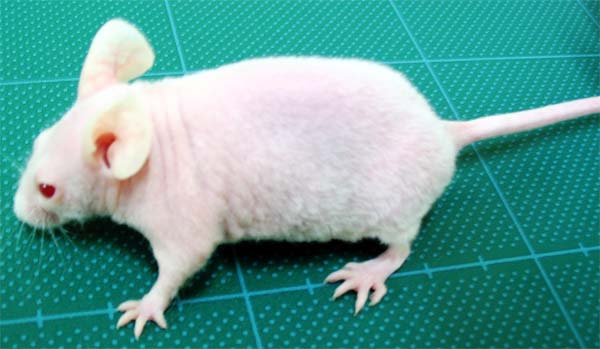HOME > mice > YPC mice
Strain Detail: YPC mice
| Strain information | |
|---|---|
| Resource No. | nbio006 |
| Strain name | YPC |
| Strain Nomenclature | |
| Common name/Synonyms | Poor coat mice |
| Strain types | inbred |
| Background strain | |
| Institution | National Institutes of Biomedical Innovation, Health and Nutrition (NIBIOHN)(formerly, National Institute of Health) |
| Developer | Shigetoshi Kurosawa |
| Depositor | |
| Conditions of distribution | without conditions: contact us |
| Animal Health Report | |
| Strain description |  YPC is a mutant strain established from a Swiss albino mouse colony, which shows thin and short hairs, wavy vibrissae, and poorly developed hair bulbs and dermal papillae, but structures of the epidermis, dermis, and the sebaceous glands are normal (ref.1). Sequence analysis revealed a single C-to-A nucleotide substitution at nucleotide 1382 in the Sgk3/Sgkl/CISK gene, causing a nonsense mutation at codon 461 (ref.2). Sgk3 knockout mice also show defective hair follicle development (ref.3). Therefore, Sgk3 is thought to be related to hair follicle development and homeostasis. Phosphorylation of GSK3β at Ser9 and the nuclear accumulation of β-catenin were reduced in YPC hair follicle, suggesting that phosphorylation of GSK3β and WNT-β-catenin pathway takes part in the SGK3-dependent regulation of hair follicle development (ref.4). YPC-B6congenic mouse (nbio069) is produced by backcrossing to C57BL/6 strain, and the mouse is available from the bank. |
| Reference(s) |
|
| Resource information | |||
|---|---|---|---|
| Cryopreserved sperm | In-house | Genotype | ypc/ypc |
| Medium | FERTIUP | ||
| From other institutions | Genotype | ||
| Medium | |||
| Cryopreserved embryo | In-house | Mating System | |
| Genotype | ypc/ypc | ||
| Medium | EFS40 | ||
| From other institutions | Mating System | ||
| Genotype | |||
| Method | |||
| Strain status / Availability | Cryopreserved sperm | Within 1 month | |
| Cryopreserved embryo | Within 1 month | ||
| Live animals | Approx. 2 months | ||
| Gene information | |
|---|---|
| Mutation types | spontaneous mutation |
| Gene symbol | Sgk3/Sgkl/CISK |
| Gene name | Serum/glucocorticoid-regulated kinase 3, Serum and glucocorticoid-inducible kinase-like kinase, Cytokine-Independent Survival Kinase |
| Genotyping information | |
